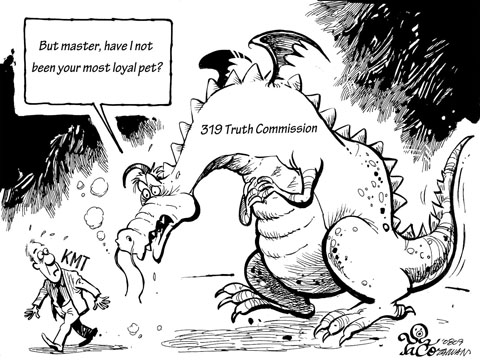Warm
Taiwan-PRC ties a US concern: report
OPPOSITION: The CSR report
also underlined the importance of a strong DPP to counterbalance KMT rule and
promote Taiwanese democracy
By Charles Snyder
STAFF REPORTER IN WASHINGTON
Saturday, Oct 04, 2008, Page 1
President Ma Ying-jeou’s (馬英九) efforts to improve relations with China will
create new challenges for US policymakers amid concerns that those efforts could
compromise US interests in the East Asian region, a new congressional report
says.
The report was sent to members of Congress last month by the Congressional
Research Service (CRS), a body that provides research and advice to lawmakers on
policy issues they will have to deal with in the coming period. Its findings
often condition how Congress deals with issues such as Taiwan.
“While US policy favors improvements in Taiwan-PRC [People’s Republic of China]
relations, it has been silent on what should be the speed, depth, and degree of
cross-strait conciliation,” the report said.
“Some observers worry that the KMT [Chinese Nationalist Party] government,
driven by economic imperatives and pressures from the Taiwan business community,
quickly could reach an accommodation with Beijing that may complicate US
regional interests,” it said.
The report contrasted US policy choices under Ma with the increasingly frigid
Taiwan-US relations during the last years of the Chen Shui-bian (陳水扁)
administration.
While it found many of the Chen-era problems remaining, it saw both
opportunities and potential problems under the Ma administration.
“With Taiwan under the KMT government, the United States will be faced with
challenges familiar from past years,” including new arms sales, visa requests by
Ma and other senior Taiwanese officials, the level of relations with Ma and such
economic issues as whether to grant Taiwan a free-trade agreement, the report by
CRS Asia specialist Kerry Dumbaugh said.
“In addition, Taiwan-US relations under the KMT government face new challenges —
notably the implications that President Ma’s initiatives toward the PRC have for
US interests; and what role, if any, Washington should play in Taiwan-PRC
relations,” the report said.
Regarding the freeze in US arms sales to Taiwan, the CRS report said the issue
“takes on new shades of delicacy in an environment of improving Taiwan-PRC
ties.”
New sales or a continuation of the year long freeze can have “symbolic
significance” for China and Taiwan, it said.
“US policymakers will be faced with decisions on what kind of signal a specific
US arms sale will send under current circumstances,” and future sales “may have
significant implications for cross-strait ties,” it said.
The report also called for a strengthened Democratic Progressive Party as an
effective opposition to KMT rule.
“Many feel that US interests in having Taiwan remain a full-fledged democracy
may be compromised should the opposition remain too feeble effectively to
monitor and hold accountable the majority party,” the report said.
